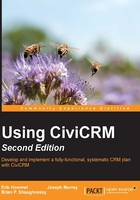
How CiviCRM will help your organization
Good CRM implementations facilitate better outcomes and improved relationships with your constituents, which may be measured by such things as increased donations or volunteer time. They also improve staff efficiency and automate workflows, reducing the average cost and time involved in interactions with the constituents. This allows you and your organization to do more. CiviCRM will improve the relationship your constituents have with your organization through various features, including the following:
- Easier online event registration
- Self-serve membership renewal
- More complete record of history of interactions available to the entire qualified staff
- Automated workflow improvements for case management
- Personalized communications
- E-mail communication self-management (subscribe/unsubscribe tools) and mailing result statistics
Improved relationships also result from deeper changes to the underlying work of an organization. Segmentation of constituents can enable more targeted and effective communication and interaction. For example, sending a text version of your newsletter rather than the normal HTML version to those who have not opened three HTML issues in a row can improve deliverability. Cross-marketing action alerts to frequent donors, or donation appeals to frequent activists, can be more effective than sending these appeals to all donors or activists, since the latter may end up filling people's inboxes too frequently, leading many to unsubscribe. Surveying those who immediately return for more service on their case can reveal systemic issues in case of management protocols, or quality assurance issues.
Organizations with well-focused and right-sized CRM strategies properly balance the costs of acquiring and updating constituent information against the benefits of having and using it. Staff effort and constituent inconvenience mean that it is often better not to force, or even encourage, the entry of less important information. Nonetheless, CiviCRM will provide quantitative and qualitative information that can guide actions, inform executive decision-making, and allow balanced scorecard types of reporting to boards and external funders.